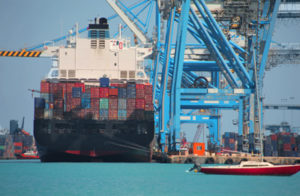 Why is cargo insurance so important?
Why is cargo insurance so important?
You could be asked to pay millions for a sunken cargo ship even if you are only shipping a few thousand dollars in goods, according to a recent Entrepreneur Magazine article.
The article, “Does Your Business Need Cargo Insurance” by Carol Tice, told the story of a small shipper who used a cargo ship that was struck by rebel shelling in Beirut’s harbor in the 1980s.A few weeks later the shipper received a bill for millions – his company’s portion of the ship’s replacement cost.
If a cargo ship transporting goods is damaged at sea or cargo must be jettisoned to save the ship, all the ship’s customers share in covering the losses according to provision known as the “general average “clause.
According to the Mid-Atlantic Shippers Association, on average a cargo ship sinks every day and 30% of losses in transit are considered unavoidable.
Another reason Cargo insurance is important for business is the growing problem of cargo theft, which causes up to $30 billion in yearly losses for companies in the United States, according to the Federal Bureau of Investigation.
Types of Cargo Insurance include:
• Ocean/Marine Cargo Insurance is used by those who ship cargo internationally, including importers and exporters, logistics providers, ocean cargo carriers, manufacturers, distributors, wholesalers and retailers.
Marine Insurance covers the loss or damage of ships, cargo, terminals, and any transport or cargo by which property is transferred, acquired, or held between the points of origin and final destination.
Cargo Marine – Businesses that require Marine Insurance include:
- Cargo and Shipping Companies
- Marina Operators
- Boat Dealers
- Yacht Clubs
- Yacht Dealers and Brokers
- Boat Builders
Marine Cargo Insurance protects against loss from the time cargo leaves port until it reaches its destination.
Marine Facilities Insurance covers Marina operators, boat dealers and yacht clubs, boat builders and yacht brokers. Coverage offers protection against risks that can occur both at sea and on land.
Commercial Marine Insurance can include commercial general liability, property, commercial automobile, inland marine (computers and heavy equipment, floaters), boiler and machinery, crime and fidelity, business interruption, sudden and accidental pollution and umbrella coverage.
Marina Operators Insurance can include coverage for wet and dry storage, hauling and launching, hull and machinery, docks, slips and piers, work boats, repair and fueling, brokers legal liability, and sudden and accidental pollution.
Boat Dealer Insurance can cover inventory, transit and demonstration, title errors and omissions, false pretense, truth in lending, boat shows, sudden and accidental, pollution, boat builder insurance, hull and machinery, molds, sea trials, manufacturer special extensions tailored to builders, and sudden and accidental pollution,
Yacht Club Insurance can cover fleets, regatta liability and sail training, special extensions tailored to yacht clubs, and sudden and accidental pollution.
Marine Liability Insurance covers terminal operators, charterers, ship yards/repairers, marine contractors and stevedoring operations must protect against risks that can impact their corporate assets.
Comprehensive Marine Insurance policies can cover primary commercial marine liability, excess commercial marine liability, umbrella coverage, marine general liability, ship repairers’ liability, wharfinger’s liability, marine terminal operators’ liability, stevedore’s liability and charterer’s legal liability.
• Inland Marine Cargo Insurance is insurance for “property in transit over land, certain types of moveable property, instrumentalities of transportation (such as bridges, roads, and piers) instrumentalities of communication (such as television and radio towers), and legal liability exposures of bailees,” according to the International Risk Management Institute.
Inland marine insurance includes coverage for a wide variety of property types, including construction equipment, medical equipment, cameras, musical instruments, fine art, communications equipment and many other items.
Despite the word marine, inland marine coverage typically covers property on land.
Property used in your business that is routinely moved off-site may not be covered by a standard business owner’s policy and a company could be at risk without the protection offered by Inland Marine Insurance.
Inland marine policies became known as “floaters” since the property to which coverage was originally extended was essentially “floating.” The coverage has grown to include property that just involves an element of transportation and can include:
• Items that are in transit
• Items held by a “bailee”
• Items at a set location that is an instrument of transportation
• Movable goods that are often at different locations
Some additional examples of items often covered by Inland Marine Insurance include:
• Computers systems
• Tools and equipment for artists.
• Fine art and tools owned by art dealers and galleries.
• Photographers camera equipment
• Cargo transported by a trucker
• Equipment owned by mobile pet groomers.
• Vending machines
• Domestic Transport Cargo Insurance covers cargo shipments within the country of origin.
Motor Truck Cargo Insurance covers the freight or commodity transported by a for-hire truck, including your liability for cargo lost or damaged due to fire or collision. Removal Expenses coverage can cover loads accidentally dumped on a road or waterway.
Domestic Motor Truck Cargo Insurance coverage pays for removing debris. Efforts to curtail further loss are normally covered under Sue and Labor Coverage. Legal expenses and even freight charges the customer loses because of not delivering a load may be covered by Earned Freight Coverage.
Many risk managers now require truckers to insure their cargo.
Motor Truck Cargo insurance is typically not available on garbage trucks, limos, hearses, buses, passenger vans or ice cream trucks.
• Import/Export Cargo Insurance can be used by distributors, wholesalers and freight forwarders. Import/Export Cargo insurance can allow your insurance company to expedite release of cargo in the event of a “General Average” and can also help meet contractual requirements to protect a buyer or bank’s interest.
Cargo insurance often involves complex issues of international law and insurance.
For freight forwarders involved in cargo and import/export businesses contingent cargo insurance can protect your assets and your business reputation and enhance and protects your relationship with your customers.
Contingent cargo insurance is a secondary insurance that covers some or all of the cost of handling, storing of or replacing cargo that’s refused, damaged or lost. It kicks in only if primary insurance doesn’t cover such costs. It is called contingent cargo insurance because it covers unexpected expenses that aren’t covered in a primary insurance policy.
Many property policies don’t cover global transactions so freight forwarders use international contingent cargo insurance to provide two types of cargo coverage. For overseas shipments, open cargo policies insure shipments that meet specific criteria, such as cost, shipping rates and the nature of the cargo. In contrast, voyage policies offer protection during a specific shipment. Both types of insurance offer insurance from the moment the cargo leaves the seller until it reaches the buyer. War risk coverage can offer additional protection in areas of conflict.
Depending on your business, needed coverage can include comprehensive contingent cargo insurance, commercial vehicle or fleet insurance, workers compensation insurance and additional coverage.
Contact Golden Global Insurance at 305-899-5125 to develop an insurance plan that meets your needs to control both risks and costs.

















